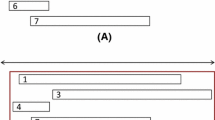Abstract
This paper considers scheduling tasks while minimizing the power consumption of one or more processors, each of which can go to sleep at a fixed cost \(\alpha \). There are two natural versions of this problem, both considered extensively in recent work: minimize the total power consumption (including computation time), or minimize the number of “gaps” in execution. For both versions in a multiprocessor system, we develop a polynomial-time algorithm based on sophisticated dynamic programming. In a generalization of the power-saving problem, where each task can execute in any of a specified set of time intervals, we develop a \((1+{2 \over 3} \alpha )\)-approximation, and show that dependence on \(\alpha \) is necessary. In contrast, the analogous multi-interval gap scheduling problem is set-cover hard (and thus not \(o(\lg n)\)-approximable), even in the special cases of just two intervals per job or just three unit intervals per job. We also prove several other hardness-of-approximation results. Finally, we give an \(O(\sqrt{n})\)-approximation for maximizing throughput given a hard upper bound on the number of gaps.
Similar content being viewed by others
References
Augustine, J., Irani, S., & Swamy, C. (2004). Optimal power-down strategies. In Proceedings of the 45th symposium on foundations of computer science, October (pp. 530–539). Rome, Italy.
Baptiste. P. (2006). Scheduling unit tasks to minimize the number of idle periods: A polynomial time algorithm for offline dynamic power management. In Proceedings of the 17th annual ACM-SIAM symposium on discrete algorithm (pp. 364–367). Miami, FL.
Benini, L., Bogliolo, A., & De Micheli, G. (2000). A survey of design techniques for system-level dynamic power management. IEEE Transactions on Very Large Scale Integration (VLSI) Systems, 8(3), 229–316.
Feige, U. (1998). A threshold of \(\ln n\) for approximating set cover. Journal of the ACM, 45(4), 634–652.
Feige, U., Hajiaghayi, M., Khanna, S. & Naor, S. (2006). On approximation of minimum-gap scheduling. Unpublished manuscript.
Hurkens, C. A. J., & Schrijver, A. (1989). On the size of systems of sets every \(t\) of which have an SDR, with an application to the worst-case ratio of heuristics for packing problems. SIAM Journal on Discrete Mathematics, 2(1), 68–72.
Irani, S., & Pruhs, K. R. (2005). Algorithmic problems in power management. SIGACT News, 36(2), 63–76.
Irani, S., Shukla, S., & Gupta, R. (2003). Algorithms for power savings. In Proceedings of the 14th annual ACM-SIAM symposium on discrete algorithms (pp. 37–46). Baltimore, MD.
Trevisan, L. (2001). Non-approximability results for optimization problems on bounded degree instances. In Proceedings of the 33rd annual ACM symposium on theory of, computing (pp. 453–461).
Douglas, B. (1996). West. Introduction to graph theory. Upper Saddle River, NJ: Prentice Hall Inc.
Acknowledgments
M. Ghodsi—Supported in part by Institute for Theoretical Physics and Mathematics (IPM) under Grant Numbers CS1385-2-01 and CS1384-6-01. We thank the anonymous referees for helpful comments.
Author information
Authors and Affiliations
Corresponding author
Additional information
A preliminary version of this paper appeared in Proceedings of the 19th ACM Symposium on Parallelism in Algorithms and Architectures, 2007, pp. 46–54.
Rights and permissions
About this article
Cite this article
Demaine, E.D., Ghodsi, M., Hajiaghayi, M. et al. Scheduling to minimize gaps and power consumption. J Sched 16, 151–160 (2013). https://doi.org/10.1007/s10951-012-0309-6
Received:
Accepted:
Published:
Issue Date:
DOI: https://doi.org/10.1007/s10951-012-0309-6




